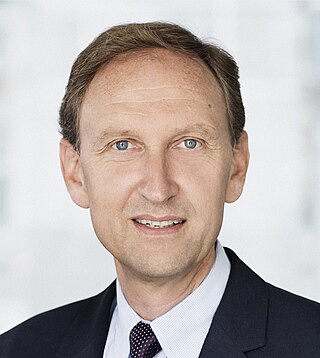The Mont Pelerin Society (MPS), founded in 1947, is an international academic society of economists, political philosophers, and other intellectuals who share a classical liberal outlook. It is headquartered at Texas Tech University in Lubbock, Texas, United States. The society advocates freedom of expression, free market economic policies, and an open society. Further, the society seeks to discover ways in which the private sector can replace many functions currently provided by government entities.
Einar is a Scandinavian given name deriving from the Old Norse name Einarr, which according to Guðbrandur Vigfússon is directly connected with the concept of the einherjar, warriors who died in battle and ascended to Valhalla in Norse mythology. Vigfússon comments that 'the name Einarr is properly = einheri" and points to a relation to the term with the Old Norse common nouns einarðr and einörð.
Dagsavisen is a daily newspaper published in Oslo, Norway. The former party organ of the Norwegian Labour Party, the ties loosened over time from 1975 to 1999. It has borne several names, and was called Arbeiderbladet from 1923 to 1997. Eirik Hoff Lysholm is editor-in-chief. The newspaper depends on economic support from the Norwegian Government.

The expression Geneva School refers to (1) a group of linguists based in Geneva who pioneered modern structural linguistics; (2) a group of literary theorists and critics working from a phenomenological perspective; and (3) a group of economists and political economists working on principles of neoliberalism.

Walter Eucken was a German economist of the Freiburg school and father of ordoliberalism. He is closely linked with the development of the concept of "social market economy".

Trygve J. B. Hoff born in Kristiana, Norway was a Norwegian businessman, writer and editor of Farmand, the Norwegian business magazine.
Germany has taken many forms throughout the history of censorship in the country. Various regimes have restricted the press, cinema, literature, and other entertainment venues. In contemporary Germany, the Grundgesetz generally guarantees freedom of press, speech, and opinion.
Peter Kurrild-Klitgaard, is a Danish political scientist with a particular interest in public choice analysis and classical liberalism.
Bjorn, Bjorne, Björn, Bjørn, Beorn or, rarely, Bjôrn, Biorn, or Latinized Biornus, Brum (Portuguese), is a Scandinavian male given name, or less often a surname. The name means "bear". In Swedish and Finnish, the nickname Nalle refers to Björn.
Events in the year 1947 in Norway.
Events in the year 1895 in Norway.
Einar Hoffstad was a Norwegian encyclopedist, newspaper editor, writer and economist. He remains best known as the editor of the encyclopedia Merkantilt biografisk leksikon and the business periodical Farmand. Although initially a classic liberal, Hoffstad embraced fascism and collectivism at the beginning of the Second World War.
Thomas Scheen Falck, Jr. was a Norwegian ship-owner.
Johan Einarsen was a Norwegian jurist and economist.
Erling Steen was a Norwegian businessman, humanitarian leader and member of the Norwegian resistance movement in World War II.
Ole-Jacob Hoff was a Norwegian economist, academician, author, publisher, and scholar. The son of a fellow economist and author, Trygve Hoff, Ole-Jacob Hoff also functioned as editor of the Norwegian-language economic periodical Farmand until 1989. He graduated from Harvard University and was a social and political critic and speaker.
Mandag Morgen, also known as Ugebrevet Mandag Morgen, is a Danish weekly business and political magazine published in Copenhagen, Denmark.

Andreas Kjær is a Danish physician-scientist and European Research Council (ERC) advanced grantee. He is professor at the University of Copenhagen and chief physician at Rigshospitalet, the National University Hospital of Denmark. He is board certified in Nuclear Medicine and his research is focused on molecular imaging with PET and PET/MRI and targeted radionuclide therapies (theranostics) in cancer. His achievements include development of several new PET tracers that have reached first-in-human clinical use. He has published more than 400 peer-review articles, filed 10 patents, supervised more than 40 PhD students and received numerous prestigious scientific awards over the years. He is a member of the Danish Academy of Technical Sciences
Niels Jørgen Kiær Mürer was a Norwegian journalist and non-fiction writer.
Ole Bjørn Kraft was a Danish journalist and politician who was the leader of the Conservative People's Party. He also served as the minister of foreign affairs.




